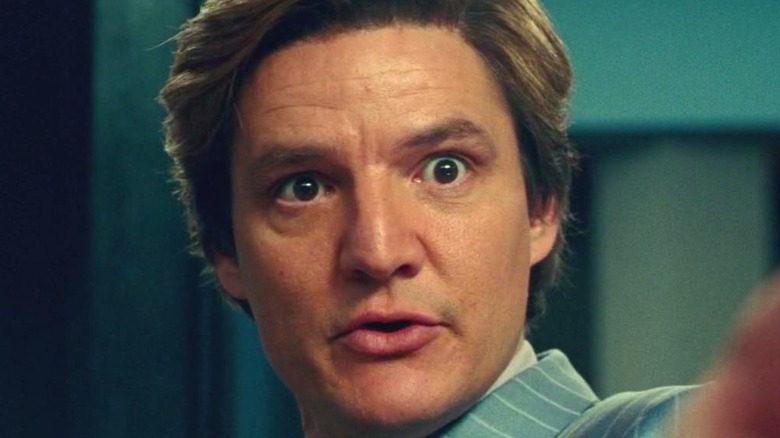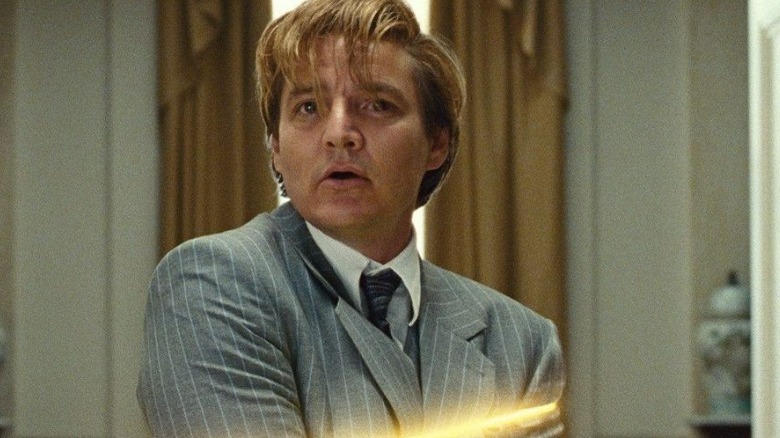The Maxwell Lord Detail In Wonder Woman 1984 That Has DCEU Fans Scratching Their Heads
The DC Extended Universe had created some division in the comic book movie fandom with such releases as "Batman v. Superman: Dawn of Justice" and "Suicide Squad." Thankfully, 2017 provided the masses with "Wonder Woman" from director Patty Jenkins: a film that satisfied nearly all who checked it out. Not to mention, it took in over $800 million at the box office, making it abundantly clear to Warner Bros. that a sequel would be in the best interest of everyone. A mere three years later, "Wonder Woman 1984" arrived at select theaters and on the HBO Max streaming service.
Set in the titular year of 1984, Diana (Gal Gadot) has done her best to assimilate into human society, but she struggles to make friends and move on from her first love, Steve Trevor (Chris Pine). Nevertheless, she continues to do good in the world as Wonder Woman, which soon puts her into conflict with a man named Maxwell Lord (Pedro Pascal). Desperate for success and power, Lord uses a mysterious artifact known as the Dreamstone to achieve his goals — an approach that not only puts his life in danger but also sends a Cold War-era society into further disarray.
Unlike many villains in modern superhero media, Maxwell Lord survives by the time the "Wonder Woman 1984" credits roll. However, something about the end of his story so far didn't sit right with many DCEU fans.
Lord hardly faced any repercussions for his actions
Upon absorbing the Dreamstone's power, Maxwell Lord starts granting wishes for all who ask. The caveat is that he gets to take something from them in return, allowing him to accumulate political and social power. With each wish, though, his health slowly deteriorates, prompting him to hijack a satellite television station to broadcast wishes across the globe and thieve the life force of millions. Thankfully, Wonder Woman puts an end to his plan and prevents him from causing any more chaos, and he gives up his power with little more than a slap on the wrist as punishment.
"How is this man not the most hated man in the world? Why does he get a happy ending? The guy nearly caused World War 3, and the whole world saw him do it. He should be in a maximum security prison on charges of terrorism or something. He freaking used his power to mentally influence the president of the U.S.!!" wrote Redditor trimble197, voicing their frustration with Lord's position at the end of "Wonder Woman 1984." Some of their fellow DC fans agreed while others pointed out that, at the end of the day, this is a superhero movie we're talking about. At some point, logic goes out the window.
As written by VenoM9078, "It's a movie about Goddess living among men and taking taxis to work instead of flying / running around but THAT is where you draw the line for realism?" "I mean this a movie when everyone, EVERYONE in the world deny their wish, like humanity dont work like that," added Brukayne23, who also used the conversation to express their disappointment in the film's third act as a whole. Additionally, a handful of other commenters brought up the status of the Dreamstone in the DCEU, which is something the franchise has yet to divulge almost two years beyond the premiere of "Wonder Woman 1984."
All things considered, "Wonder Woman 1984" has gone down as one of the weaker DCEU entries for more reasons than one. According to some people, Maxwell Lord's relatively happy ending after causing damage all over Earth is certainly among them.

